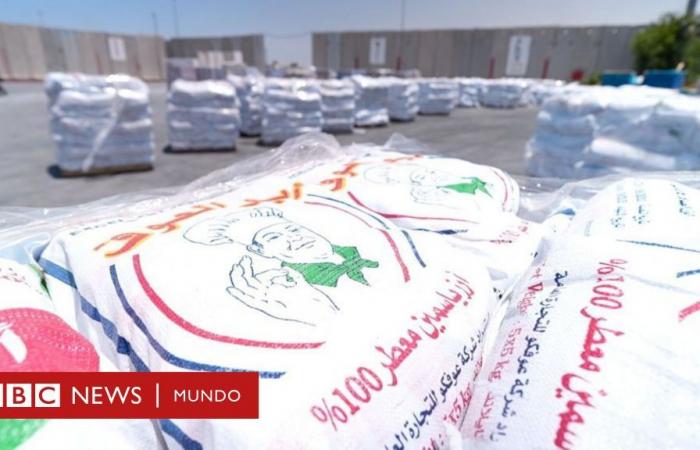
- Author, Yolande Knell
- Role, BBC Middle East correspondent
- Reporting from Kerem Shalom, Israel
-
3 hours
On the border between Israel and Gaza, hundreds of pallets lie in the sun packed with food, from bunches of bananas to packets of rice.
A few kilometers away, there are many Palestinian families who are hungry.
Although Israel’s military paused daytime fighting on a major stretch of road near the main Kerem Shalom crossing last week, humanitarian agencies say they are still struggling to get aid into southern Gaza.
They blame the growing anarchy for making too dangerous to collect and transport goods in the zone.
“Looting has intensified,” said Georgios Petropoulos, head of the United Nations Office for the Coordination of Humanitarian Affairs (OCHA) in Gaza.
He estimates that on Tuesday, June 18, three quarters of the merchandise loaded by the trucks that passed through the crossing were stolen.
UN officials say vehicles are stopped and attacked by armed gangs, particularly those smuggling cigarettes that are then sold at sky-high prices on the black market in Gaza.
Trucks transporting fuel to the Palestinian territory have also been targeted recently.
Following the overthrow of the Hamas government in Gaza by Israel’s military offensive, there are no plans to fill the power vacuum.
Furthermore, few police officers are still working in the Palestinian territory and it is not known whether organized crime gangs are affiliated with Hamas or Gaza clans.
“We have to decide what we are going to do to (maintain) civil order in Gaza and who will be in charge of maintaining it,” Petropoulos says.
Criticism of agencies
At a press conference in Kerem Shalom, Cogat, a body that is part of the Israeli military and responsible for operating the crossings, explained that it had not placed a limit on the amount of aid that could reach Gaza.
Cogat showed images of what they say was a buildup of more than 1,000 trucks full of aid, which had already undergone security checks and was waiting to be picked up on the Gazan side.
“This is largely due to the fact that international organizations have not taken sufficient measures to improve their distribution capacity,” said Cogat spokesman Shimon Freedman.
The official accused the UN, the main provider of aid to Gaza, of not having enough trucks and said the body needed to “increase manpower, extend working hours and increase storage” as well as take other “logistical measures.” and organizational”.
During the war, Israel has intensified its criticism of humanitarian aid agencies, as the International Court of Justice twice issued provisional measures ordering the country to allow the entry of humanitarian assistance to Gaza.
Those measures arose as a result of the case brought by South Africa alleging that Israel has violated the 1948 Genocide Convention, an allegation the country strongly denies.
The UN and humanitarian aid groups refute accusations that they are inefficient and understaffed.
They point out the difficulties of operating in an active war zone and say that Israeli bombing has damaged their infrastructure and reduced their capacity.
“Rules and procedures are constantly changing”
“We have recruited dozens of new workers and hundreds of volunteers to distribute aid,” explains Sean Carroll, president of American Near East Refugee Aid (Anera).
“We have delivered 28 million plates of food and six million medical treatments, so [claramente] we can gather manpower,” he continues.
But he points out that increasing workers doesn’t help when “war makes collecting goods too dangerous or too dangerous.” roads are impassable. [Tampoco ayuda] when there is not enough fuel and there are not enough trucks or spare parts inside Gaza.
Anera welcomed the fact that Cogat had committed this week to allowing the import of more trucks to Gaza, and stated that it was campaigning to buy them urgently.
However, Carroll adds that a problem remains “the arbitrariness of rules and procedures“which are constantly changing” when it comes to moving goods.
Aid groups highlight how the overstretched aid system in Gaza collapsed in May when Israel began its military ground invasion in the populated southern city of Rafah, claiming it was attacking battalions of Hamas fighters sheltering there.
Around a million Palestinians, most of them already displaced by the fighting, were forced to flee the city, deepening the humanitarian crisis.
At the same time, aid organizations lost access to important storage and distribution centers.
Since Israeli forces took control of the Palestinian side of the Rafah border crossing, Egypt has banned its use, arguing that it is no longer safe for aid workers.
Now aid and fuel are being sent via Kerem Shalom.
According to UN figures, a daily average of 97 aid trucks entered Gaza in May, 42% less than the previous month.
In the first two weeks of June, the number dropped again to 89 trucks.
Residents of Khan Younis, a town near Rafah, told the BBC that no international aid is currently reaching them.
“When we were in Rafah, from time to time we saw help. Since we arrived here, 20 days ago, we still haven’t seen anything,” says Mahmoud al-Biss, who says he struggles to feed his two children.
“Chaos has taken over the country”
Locals describe a vicious circle in which Growing desperation forces people to loot aid trucks that arrive.
Apparently, some items that have been donated, such as sunflower oil and sugar, are being sold at market stalls in the city.
“Nowadays, chaos has taken over the country. We no longer receive aid coupons and when aid arrives, we steal it,” admits a man named Hassan.
In an effort to make up for the shortfall in goods, Israeli authorities have begun allowing more private buyers in Gaza to bring supplies from Israel and the occupied West Bank.
Unlike UN convoys, these trucks they use armed escorts who are hired privately. This security measure allows them to defend themselves against possible attacks.
However, many of these items entering the market are unaffordable for most Gazans.
Israel has opened three more crossings into Gaza, allowing access to aid for residents of the northern part of the strip, where the UN has warned there is the greatest risk of famine.
Aid that used to be dropped from planes has largely stopped, but the sea corridor from Cyprus reopened on Thursday, June 20.
There have been a number of difficulties with a floating dock that was installed by the US military and cost about $230 million.
OCHA’s Petropoulos describes the construction of the pier as “a failure.”
And remember that you can receive notifications in our app. Download the latest version and activate them.





